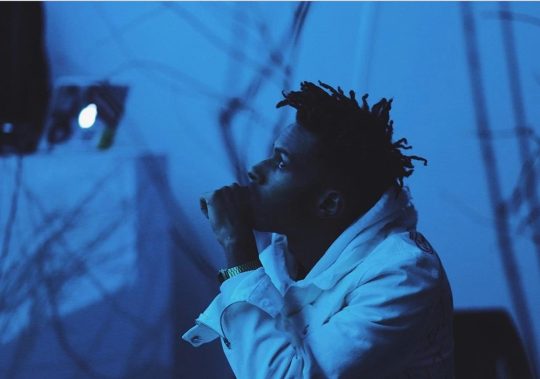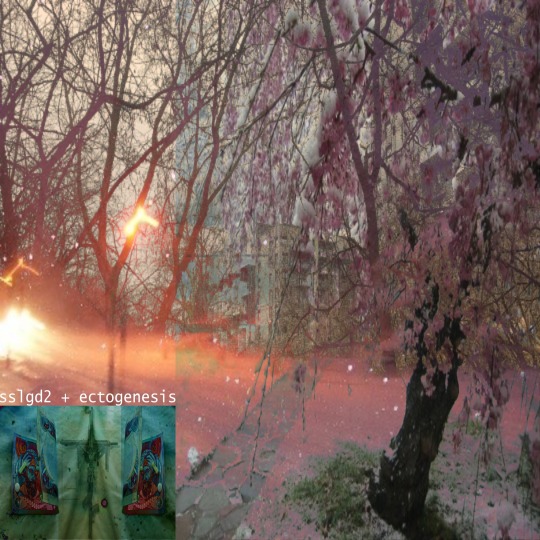#ambient rap
Video
youtube
Dear listener, I’ve spent the entire month posting some of the rarest hip-hop I know about to Tumblr. Here’s one more track that is a little more emotionally vulnerable than the rest of the pack. Don Lifted isn’t a household name, he’s not big in the music industry (yet) and compared to other modern hip-hop fat cats he’s got a relatively tiny discography to his name. However, if there’s one thing this talented gentleman provides, it’s an elegantly distinctive and rare form of sub-genre which I can only describe as ambient rap. Heavily instrumental, meaningful, and even atmospheric, Lifted is a sculptor of language and a true poet that brings a lo-fi sound to hip hop that is jarringly different than anything your average rapper could or would bring to the table. It’s got an R&B vibe that accentuates love, transience, and loss. His tunes are oddly romantic, quietly anxious, and far more ambitiously artistic in overall style than I think I’ve ever heard from this entire field of melody. He doesn’t just rap, he often tells a heartfelt story with his tunes. Hailing from Memphis, TN and steeped in visual arts, Lifted uses his talents to create a picture, a painting with his words. I’m not personally a big fan of emo, but he mixes emo with shoegaze and east coast rap which somehow manages to turn my hardened heart into a sack of mush. There are contemplative rappers out there for sure, always have been, always will be. But what this reflective performer does transcends mere contemplation and undergoes a downright lost and absorbed experience of introspection. This is Golden (The Wait) from the 2021 album 325i. It’s been my pleasure to deliver some much-needed hip hop to my page, smash play and enjoy!

I feel as if I haven’t ever come across someone so strong on the visual/audio artform as the artist pictured above. I implore you to make him more popular. Image source: https://memphismusichalloffame.com/local_artist/don-lifted/
#don lifted#golden (the wait)#325i#featuring MadameFraankie#r&b#emo#shoegaze#hip hop#music#music on tumblr#audio#poet#ambient rap#memphis rapper#audio video#audio on tumblr
16 notes
·
View notes
Photo

Roc Marciano & The Alchemist - The Elephant Man’s Bones
(Gangsta Rap, Jazz Rap, Ambient Rap)
Atop The Alchemist's minimal, sinister beats, Roc Marciano indulges in some of the most tense and humorous music he's put out to date. The Elephant Man's Bones' juxtaposition of calm production and ruthless, cold-hearted bars from Marciano make for one wonderfully dark and luxurious listen.
☆☆☆☆
Named after the Englishman Joseph Merrick, the man who inspired the title of Roc Marciano and The Alchemist's latest album perfectly embodies the duo's artsy, nefarious songcraft. Known as the Elephant Man as a result of some painful, severe physical deformities, he spent his 27 years being both mocked and revered by the public as a biological anomaly, his life explored in a myriad number of books, films, and stage plays - at one point, it was reported that Michael Jackson was so moved by Merrick's life story that he allegedly offered $500,000, later a full million, to purchase his skeleton from the Royal London Hospital. Marciano and The Alchemist share a similar fascination in the lines between disturbing and elegant, The Elephant Man's Bones mixing Marciano's tales of street violence, drug-running and expensive couture with beats that are restrained, colorful, and organic. Far away from Marciano's traditionally cold, heavy sound, The Alchemist's smooth and slightly off-kilter production pushing Marciano into new territory that shapes his rapping and presence to be stronger than it's been in years, The Elephant Man's Bones breathing new life into his skillful, deadpan bars.
The Alchemist is an unexpectedly great fit for Marciano, his recent production for albums like Armand Hammer's Haram or Conway the Machine's God Don't Make Mistakes translating perfectly to Marciano's cold-blooded presence as he turns his production inside-out, emphasizing clean samples and rich keyboards that are as elegant as they are menacing. I honestly haven't enjoyed The Alchemist's production as much as I do here in a long while - I never was the biggest fan of how his beats landed with Freddie Gibbs on 2020's Alfredo, and his one-off beats on albums this year like SICK! and Crocodrillo Turbo were some of my least favorite of those projects - but there's a comfort and effortlessness to his work with Marciano that takes things to a level of luxury and richness he hasn't approached until now: the way opening track Rubber Hand Grip blends smoky keyboards with sharp, anxious string drones that immediately set the albums tone; the heavenly sample on the title track or the dusty loop driving JJ Flash forward. Not one of The Elephant Man's Bones' beats disappoints, all contributing to the album's mix of left-field lounge jazz warmth and cold-hearted lyrics that make it such an ominous, satisfying listen.
And Marciano's bars are stronger than they've ever been, a clarity and cleverness to his writing that seamlessly integrates into some of his most villainous and menacing stories to date. Daddy Kane references everything from Breaking Bad to Olympic gymnast Suni Lee and Jimi Hendrix, and somehow ties it all together as Marciano contemplates his success over a fuzzy electronic drum loop and vintage synths, and the narcotized beat Alchemist throws onto Liquid Coke is fit just right for him to both throw out some of his signature blunt threats ("Don't make me dig in my bag, the magnum ain't gift-wrapped / ...It's not a catch twenty-two, this a TEC-22") and reflect on the ways he's been affected by that same criminal violence a few lines later ("Expensive clothes won't soothe / All this ice won't remove my bruise"). It seems linking with The Alchemist for a longer project has got Marciano less bottled up than usual, the rowdy sound of their one-off's together traded in for a methodical and detailed approach to their songcraft, quotables scattered all about the album's fourteen tracks - some of my favorites being "For me to line you, don't need a barber's license" from Deja Vu and his clever wordplay in the second verse of Trillion Cut ("These ain't no regular old bars, this a five star restaurant") - without Marciano ever being in your face about it, his assuredness in his rapping abilities and lyrical wit paying off immensely as him and The Alchemist sustain the album's sensitive mood across the entire 38 minutes. Keeping an album with as minimalist and left-of-center a sound for artsy East Coast rap as The Elephant Man's Bones' this enjoyable all the way through is quite the challenge, and they do it with endless charisma and personality.
Two of rap's veteran players, Marciano and The Alchemist have been at it long enough to know the best parts of their music and how to tap into them time and time again. Working with one another, they exercise those strongest muscles with support from one another that champions their ability to pull you into their world and have you hang onto every word, Marciano's voice and The Alchemist's moody beats the only two things needed for The Elephant Man's Bones to keep its winning streak alive the whole way through - even the few bumps in the road aren't all that bad in the slightest. Marciano is a specialty performer, with a single voice and refined style he bends around any beat The Alchemist throws at him, and The Elephant Man's Bones' reliance on the fact that the two of them work so good together doesn't ever cause the album to stagnate as they consistently find new angles for Marciano's voice to wrap around The Alchemist's fuzzy, whiskey-scented beats. This is genuinely some of the smoothest, loveliest hip-hop I've heard in a good while, the duo rarely missing any of their shots and delivering a killer collection of colorful, delightfully subtle rap songs that never take more than they need and still land deadly blows with just a few bullets in the chamber. The Elephant Man's Bones is unlike anything either of them have done up until now, but it sounds as if they've been honing their craft together for a lifetime - how special is that?
#roc marciano#the alchemist#the elephant man's bones#empire#ambient rap#art rap#boom bap#drumless#east coast hip hop#experimental hip hop#gangsta rap#hip hop#jazz rap#2022#8/10#album review#2022 albums
2 notes
·
View notes
Text

DJ True Darkness : - Remastered Slow Mix
Title: DJ True Darkness : - Eps. 8 : No. 3
Link - Provided In Description and Bio:
Twitch - https://lnkd.in/gK6cdcCJ
Enjoy, Thank You For Listening (:
#Rap#undergroundrap#Electronicrap#Ambientrap#TexasRap#Zro#DJTrueDarkness
#music#underground#djtruedarkness#music taste#social media#twitch#electronic#electronic music#electronic rap#ambient#ambient rap#texas rap#z ro#Bandcamp
1 note
·
View note
Audio
My first song “Dsvab4 - Fast Movers ft. Gaz (Prod. Dsvab4)” on Soundcloud and more platforms soon
1 note
·
View note
Text

A n d r e 3 0 0 0
218 notes
·
View notes
Text
reblog for more reach! <3
#poll#music#music poll#pop#rock#folk#goth#rap#punk#electronic#edm#ambient music#experimental music#industrial
65 notes
·
View notes
Text

60 notes
·
View notes
Text

By my Lonely.
#alternative#goth#rare#soundcloud#aesthetic#vintage#hiphop#music#rapper#grungy aesthetic#grunge#ambient#goth aesthetic#sadgirl#emocore#dreamcore#rap#trap#emo rap
47 notes
·
View notes
Text

This is another one...i did end up using it
#dereality#dreamcore#liminal spaces#weirdcore#esoteric#oddcore#liminality#liminal aesthetic#collage#digital art#digitalcore#soundcloud#ambient electronic#experimental music#cloud rap#SoundCloud
20 notes
·
View notes
Text
Me analyzing Ned's Cozy Fireplace:

#twenty øne piløts#the amount of lore references#plus it sounds so good#i needed this#so chill#lo fi#ambient#perfect for studying#can finally listen without the urge to rap#tyler joseph#josh dun#skeleton clique#twenty one pilots
45 notes
·
View notes
Text

Tracklist:
The Requiem
The Radiance
Burning In The Skies
Empty Spaces
When They Come For Me
Robot Boy
Jornada Del Muerto
Waiting For The End
Blackout
Wretches And Kings
Wisdom, Justice, And Love
Iridescent
Fallout
The Catalyst
The Messenger
Spotify | YouTube
#hyltta-polls#polls#artist: linkin park#language: english#language: japanese#decade: 2010s#Art Rock#Pop Rock#Electronic#Alternative Rock#Ambient#Industrial Hip Hop#Hip Hop#Rap Rock#Post-Industrial#Experimental Hip Hop
22 notes
·
View notes
Text
Listen to 過去 The Past, a playlist by chu-lan-maria on #SoundCloud
"以往的事只算得上是個序幕。
What's past is prologue."
(And by that destiny, to perform an act Whereof what's past is prologue, what to come
In yours and my discharge.
― The Tempest, Act I, Scene II, William Shakespeare.)
▪︎ 這出自威廉·莎士比亞筆下《暴風雨》第二幕第一場中的一句台詞。有時,這句短語也用於表示"不計前嫌,寄望未來的意思。"
"What's past is prologue" is a quotation of William Shakespeare from his play The Tempest. In contemporary use, the phrase stands for the idea that history sets the context for the present. The quotation is engraved on the National Archives Building in Washington, DC, and is commonly used by the military when discussing the similarities between war throughout history.
(PS. I don't own any music and songs right, I just make the playlist for listening easily and enjoy all musicians your works and love to share it only. all copyright belongs to musician & singer. If you want me do delete yours from the playlist, please tell me then I will do it. Blessings! Thanks! Lan~*)
═════════ ✾ ═════════
▪︎ Photography by Komaro Hoshino 星野 小麿

#music#playlist#mixed type#william shakespeare - quotes#classical#piano#symphony#violin#cello#clarinet#flute#guitar#vocal#ambient#remix#soundtrack#r&b#pop#hip-hop&rap#folk
28 notes
·
View notes
Photo

Moor Mother - Jazz Codes
(Experimental Hip Hop, Abstract Hip Hop, Jazz Poetry)
Exploring memory, Black musical history and the boundaries of genre, Moor Mother's latest album is a dreamy and surreal blend of everything from hip-hop and jazz to electronic and poetry, Jazz Codes fascinated with how Black music has been changed and documented over time, its innovations and losses over the years. Its dense and difficult core themes are buoyed by production that is breathable, heavenly, and surreal.
☆☆☆☆
Jazz Codes is the kind of album that demands you understand and dissect its themes to understand how its sound has come about. As Moor Mother, Camae Ayewa's music has sat close to all sorts of different styles and sounds - poetry, hip hop, jazz, dance, experimental - always contextualized and given shape by her artistic scope and willingness to analyze their histories and play with the possibilities of music through them. Whether working with rappers like billy woods to tap into Black history and weave it into trippy, unorthodox beats (Brass), creating colorful and intense concept albums (Circuit City), or putting out intense and moody dance music as 700 Bliss, Ayewa's music refuses to treat itself as one single thing, or even as one large amalgamation of different styles. Instead, her art is built on deconstructing and rebuilding the structures and systems we used to categorize it, making music that's entirely her own and that nobody else is doing on her level. Her latest album, Jazz Codes, is loosely built around those titular jazzy textures but has notes of everything from Chicago footwork to ambient music to off-kilter experimental rap, Ayewa breaking the confines of institutional placings of art within particular time frames and mixing it all into one singular, beautiful sound. Its broadest artistic strokes are anxious and jittery, but Ayewa hones in on the finer details with each song to create a surprisingly serene and atmospheric listen.
With references to beloved artists from the past dotted all over its lyrics - Coltrane and Mary Lou WIlliams, Miles Davis and Billie Holiday - one of the chief concerns Ayewa has throughout Jazz Codes is how we remember and hold onto music of the past without forgetting where it came from and what it's led to today. Thomas Stanley's outro for the album, speaking atop a swirling instrumental from Ayewa's Irreversible Entanglements group, tells us that jazz was originally a term for sex, that “its illegitimate origins [have been] lost in the murky brothels where it was conceived and birthed," Ayewa's occasionally dirty song titles like RAP JASM and NOISE JISM part of reconnecting with this past ideal, her music's blissful sound an embodiment of that sensuality and tactility. Even on tracks that aren't as upfront with this feeling, there's something about the throbbing footwork pulse of UMZANSI being kissed with Mary Lattimore's delicate harp or MEDITATION RAG's cocooning synth layers that feels just as potent with salaciousness and desire, her deeply descriptive writing on the latter as she speaks of "smoke, desire, praise" and "hips swinging, hands clapping against the chest" some of the album's most electrifying moments on one of its slowest tracks. She jumps from sound to sound with abandon, the somewhat messy nature of Jazz Codes' tracklist part of its goals as an album, hopping from DUST TOGETHER's hazy saxophones and watery pianos to the tender abstract bars of RAP JASM with AKAI SOLO, to desperately gasping for air with inconsolable exclamations of how "the band won't play" and "the drummer can't swing" on BLUES AWAY. Jazz Codes' sound has no definition, and it's the feelings you get while listening to the album that stick with you more than any of its more analytical bits.
Her fascination with it all is what keeps the album so enjoyable across its 43 minutes, Jazz Codes' excitement to explore all Ayewa's different ideas subdued by her mellow production while preserving its sense of energy and movement throughout. While the downtempo beat and sticky synth arpeggios on REAL TRILL HOURS are pure ear narcotics, the warped vocoding Ayewa throws on her voice gives the song an alien timbre, like being pulled into the orbit of a glittery asteroid belt. On other tracks, she'll opt for trembling Philly club surrounded by spacey electronics that explore her anxieties on surveillance and the ones we trust to keep us safe (BARELY WOKE), or for angular and heavy instrumental samples that contrast with her mellow, laid-back drum programming and create a sense of playfulness and sophistication at once (SO SWEET AMINA), Ayewa's previous projects all seeming to find a way to sneak their sound into Jazz Codes one way or another. In terms of its range of sounds and conceptual broadness, Jazz Codes is her strongest outing yet, taking a little bit of everything she's done thus far and condensing it into one hefty, engrossing listen. Those tonal shifts and unexpected detours are how she can connect contemporary experimentation with the experimentation of the past, the plush groove of WOODY SHAW and the rush of samples on ARMS SAVE two different ways she can explore and express what Black art means to her and the power music can hold when it disconnects itself from the pressure and arbitrary confines of genre and expectations. Ayewa has the grit, enthusiasm and musical skills to pull a project as expansive as this one off, and her full commitment to that journey is why Jazz Codes turns out such magnificent songs.
Like all her other projects, Jazz Codes will undoubtedly be one of the more unusual and eye-catching listens you'll come across this year, Ayewa driving in a lane she's been paving herself for years now and only giving you a passing glance as she lays all these ideas out with ease and thoughtfulness. But now, she puts extra emphasis on the Black artists who expanded the idea of what could be possible and allowed within music in the past - as well as what happened when their ideas were pushed out and refused by the mainstream - and through that embrace of the many ups and downs in the past, Jazz Codes is one of the most empathetic and warm-hearted releases Ayewa's put out to date. Things aren't tidy, and the timelines of musical history she pulls from here are split and manipulated by both human bias and error, but what's at the core of Jazz Codes is just how much she loves music and the magic creating art provides. More than anything else, Jazz Codes is a window into Ayewa's heart, and that's the most important thing it could do.
#moor mother#jazz codes#anti-#abstract hip hop#ambient rap#art rap#avant-garde jazz#conscious hip hop#drumless#electronic#experimental#experimental hip hop#hip hop#jazz#jazz poetry#jazz rap#2022#8/10#album review#2022 albums
0 notes
Text

DJ True Darkness : - Remastered Slow Mix
Title: DJ True Darkness : - Eps. 8 : No. 2
Link - Provided In Description and Bio:
Reddit: - https://lnkd.in/g7ymWBYG
Enjoy, Thank You For Listening (:
#Rap#undergroundrap#Electronicrap#Ambientrap#TexasRap#Z-ro #DJTrueDarkness
#music#djtruedarkness#underground#music taste#good vibes#music industry#underground rap#electronic music#Electronic Rap#ambient#Ambient Rap#texas rap#z ro#Bandcamp
1 note
·
View note
Text
how lucky we are to be alive in an age with overwhelmingly easy access to such diverse, boundless music
#music#live music#spotfiy#apple music#soundcloud#background music#musicstudio#music lovers#i love music#musician#ambient music#classical music#70s music#music video#indie music#musica#rock music#rap music#thrash metal#pop music#music bingo
127 notes
·
View notes
Audio
Kelela’s RAVE:N, The Remixes
#kelela#raven#warp records#music#electronic#techno#house#rnb#rap#jungle#drill#ambient#deep house#deconstructed club#hardcore techno#reggaeton#footwork#uk bass#glitch#rave#club#dance#bandcamp
11 notes
·
View notes